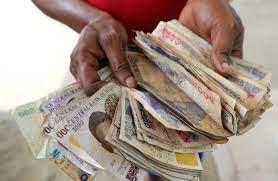- Foresee more rent seeking, round-tripping activities
The decision by the Central Bank of Nigeria (CBN) to discontinue the sale of foreign exchange to operators of bureau de change (BDC) segment of the FX market, as well as the suspension of issuance of new licenses to operators, has sparked reactions from analysts who have noted that the decision by the apex bank may lead to further speculation in the market and possible further devaluation of the naira.
 Economic analysts at Pan African Capital Research in a note to business a.m., said: “The decision of the apex bank to discontinue the sale of FX to BDCs is not expected to reduce the apex bank’s supply to Nigeria’s FX market. The constant intervention of the CBN in the market will still continue, though through a formal channel – the commercial banks. However, this may lead to speculation in the FX market and further depreciation of naira.”
Economic analysts at Pan African Capital Research in a note to business a.m., said: “The decision of the apex bank to discontinue the sale of FX to BDCs is not expected to reduce the apex bank’s supply to Nigeria’s FX market. The constant intervention of the CBN in the market will still continue, though through a formal channel – the commercial banks. However, this may lead to speculation in the FX market and further depreciation of naira.”
The CBN decision has led to calls for a more cursory analysis of the activities of the BDCs which is said to have been based on BDCs abandoning their core functions in the FX market by returning the gestures and opportunity offered to them in goodwill to the apex bank.
Godwin Emefiele, the CBN governor, reiterated that the decision was to put an end to the rent-seeking activities of operators who are interested in widening profit gaps in the market through their selfish activities. It also stated that BDC operators were diverting FX sales to wholesale rather than retail users, encouraging dollarization of the Nigerian economy, forcing the apex bank to now route FX sales for retail users through commercial banks.
The apex therefore, announced the following:
- Discontinued sales of FX to BDCs with immediate effect to curtail the illegal activities of some of the operators who are being recalcitrant to the extant rules and guidelines to the operations in the market.
- No new licensing of new BDCs in Nigeria including to those who are already in the process of being approved. The process hereby becomes terminated.
- The central bank will now re-channel its weekly FX allocations to commercial banks to meet with the legitimate needs of customers which includes for fees payment, travel, payment of medical bills, etc and as prescribed by the CBN in its previous circulars on the operating guidelines in the FX market.
- All commercial banks should, with immediate effect, dedicate a teller point at all its branches for the purpose of FX sales and purchases to customers in line with the extant guidelines on FX sales to users in Nigeria.
Emefiele further noted that when a customer presents all requirements for the purchase of FX to the bank, the bank must sell foreign exchange to the customer without questions. However, when it becomes unsatisfactory to customers, the customers are to immediately contact the apex bank through its toll free lines or via mail.
Meanwhile, the bank emphasized that these measures are not punitive on any individual or group but that it is to preserve the integrity of the shared commonwealth in the economy, hence keeping the foreign exchange market safe from rent-seeking individuals in a bid to sustain the resilience of the banking system in Nigeria.
A look at the bank’s activities in the market after the announcement shows that on a weekly basis, the CBN sells about $110.10 million to the BDCs with operators getting as much as $20,000 per BDC, which translates to $5.72 billion annually.
To some analysts this new development came as a surprise given that the BDC segment of the FX market has over 5,000 operators in Nigeria, coupled with the unabated level of FX demand at a time there is still a backlog of demand, put at marginally above $2 billion; the move, they say is, likely to lead to increased demand for the greenback.
There is also the view that it could increase the activities of speculators in the FX market as the profit gap in the market will see a rise in tempo with more rent seeking activities and round-tripping.
The fact that operators will source for FX elsewhere, such as banks, will give room for more widening profit gaps as they will sell to users who are readily available to buy for urgent purposes. Thus, bringing about more dollar scarcity due to hoarding by some banks and BDC operators, who obtained such from commercial banks, thereby bringing more pressure on the value of the naira.








